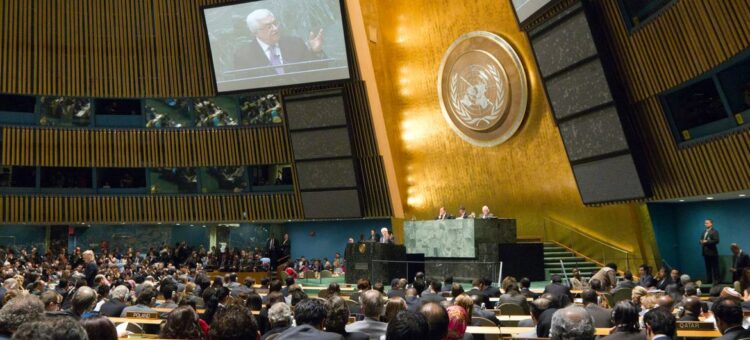By Dr. James E. Jennings
ATLANTA, USA | 24 September 2025 (IDN) — The barely viable Two-State Solution appears to have made a brief comeback at the United Nations General Assembly. Emmanuel Macron of France and Mahmoud Abbas of Palestine—one young, one old—huffed and puffed in the attempt to put new life into a near-dead body.
The patient was the long-wished-for and often presumed-dead Palestinian State. For all practical purposes, it no longer functions. The Trump Administration even irrationally denied Abbas a U.S. visa to attend the UN General Assembly—where the most important issue involving Palestine since 1947 was on the agenda.
A Moment of Recognition
Key speeches included those from UN Secretary-General António Guterres, who urged an end to Israel’s one-sided attacks on Gaza, and from France’s Macron, who declared that France formally recognizes the State of Palestine. The UK’s Prime Minister, Keir Starmer, followed with the same announcement—an especially important step, given Britain’s central role in Israel’s creation with the 1917 Balfour Declaration.
Abbas, the old man of the group—now near 90—looked his age. Long considered a weakling, barely in control of his own quasi-government under growing Israeli domination, he surprised everyone. The program for Palestinian statehood he presented was a masterpiece of clarity, statesmanship, and diplomacy. No such coherent pathway offering a genuine chance for peace in the Holy Land has been put forward by any party in over half a century.
By touching the previously untouchable hot-button issues and offering a realistic plan, Abbas made a compelling case for the Two-State Solution. It is no doubt the product of extensive consultation with supportive nations. The problem, as always, lies in securing endorsement from two key players: Israel and the United States.
Abbas’s Plan
Among Abbas’s proposals was dissolving the PLO apparatus in favor of a broader, more representative government. Hamas would be excluded, but Israel—already recognized by the Palestinians—would be guaranteed a partnership for peace and security.
International recognition of Palestine is already widespread, as the UN’s leadership and the General Assembly’s vote demonstrated. On paper, it looked like a breakthrough moment.
The Harsh Reality
Yet there is one fatal flaw: under the current political conditions in Israel and the United States—with Donald Trump as president and Netanyahu as prime minister—neither country will accede.
The assassination of right-wing influencer Charlie Kirk on September 10 has only hardened American attitudes. Far from softening policy, it intensified popular support for Trump’s pro-Likud stance on the West Bank and Gaza. Up to this moment, U.S. policy not only supports Jewish settlements in the West Bank—echoing Kirk’s mantra that “God gave the land to the Jews”—but also backs the ongoing destruction of Gaza, clearing Gaza City for Riviera-style development schemes.
This moment may well be remembered as the high-water mark of Palestinian statehood. Abbas’s plan is comprehensive and achievable. But Palestinian hopes risk yet another Nakba—another disaster.
The Danger of Leaving Peace to Politicians
People often say that peace is too important to be left to politicians. But leaving peace in this pivotal region to an erratic and venomous figure like Trump is especially dangerous. At Kirk’s memorial service, the president doubled down, saying that unlike Kirk, “I don’t forgive—I hate my opponents.”
Macron and Abbas’s plan is the best formula anyone has advanced in decades. To reject it is to invite fresh disasters—both for Palestinians and for the fragile prospects of peace in the Middle East.
*James E. Jennings, PhD, is a former Professor of Middle East History and Founder of Conscience International. A longtime advocate for Palestinian human rights, he has worked delivering aid to Gaza’s hospitals under various Israeli bombing campaigns. [IDN-InDepthNews]
Image: A view of the General Assembly Hall as Mahmoud Abbas (shown on screens), President of the Palestinian Authority, addresses the Assembly before the vote on its status in 2012. (file) UN Photo/Rick Bajornas

